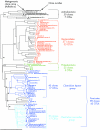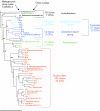Reduced diversity of faecal microbiota in Crohn's disease revealed by a metagenomic approach
- PMID: 16188921
- PMCID: PMC1856500
- DOI: 10.1136/gut.2005.073817
Reduced diversity of faecal microbiota in Crohn's disease revealed by a metagenomic approach
Abstract
Background and aim: A role for the intestinal microbial community (microbiota) in the onset and chronicity of Crohn's disease (CD) is strongly suspected. However, investigation of such a complex ecosystem is difficult, even with culture independent molecular approaches.
Methods: We used, for the first time, a comprehensive metagenomic approach to investigate the full range of intestinal microbial diversity. We used a fosmid vector to construct two libraries of genomic DNA isolated directly from faecal samples of six healthy donors and six patients with CD. Bacterial diversity was analysed by screening the two DNA libraries, each composed of 25,000 clones, for the 16S rRNA gene by DNA hybridisation.
Results: Among 1190 selected clones, we identified 125 non-redundant ribotypes mainly represented by the phyla Bacteroidetes and Firmicutes. Among the Firmicutes, 43 distinct ribotypes were identified in the healthy microbiota, compared with only 13 in CD (p<0.025). Fluorescent in situ hybridisation directly targeting 16S rRNA in faecal samples analysed individually (n=12) confirmed the significant reduction in the proportion of bacteria belonging to this phylum in CD patients (p<0.02).
Conclusion: The metagenomic approach allowed us to detect a reduced complexity of the bacterial phylum Firmicutes as a signature of the faecal microbiota in patients with CD. It also indicated the presence of new bacterial species.
Conflict of interest statement
Conflict of interest: None declared.
Comment in
-
Reduced microbial diversity in inflammatory bowel diseases.Gut. 2006 Aug;55(8):1207. Gut. 2006. PMID: 16849351 Free PMC article. No abstract available.
References
Publication types
MeSH terms
Substances
LinkOut - more resources
Full Text Sources
Other Literature Sources
Medical





